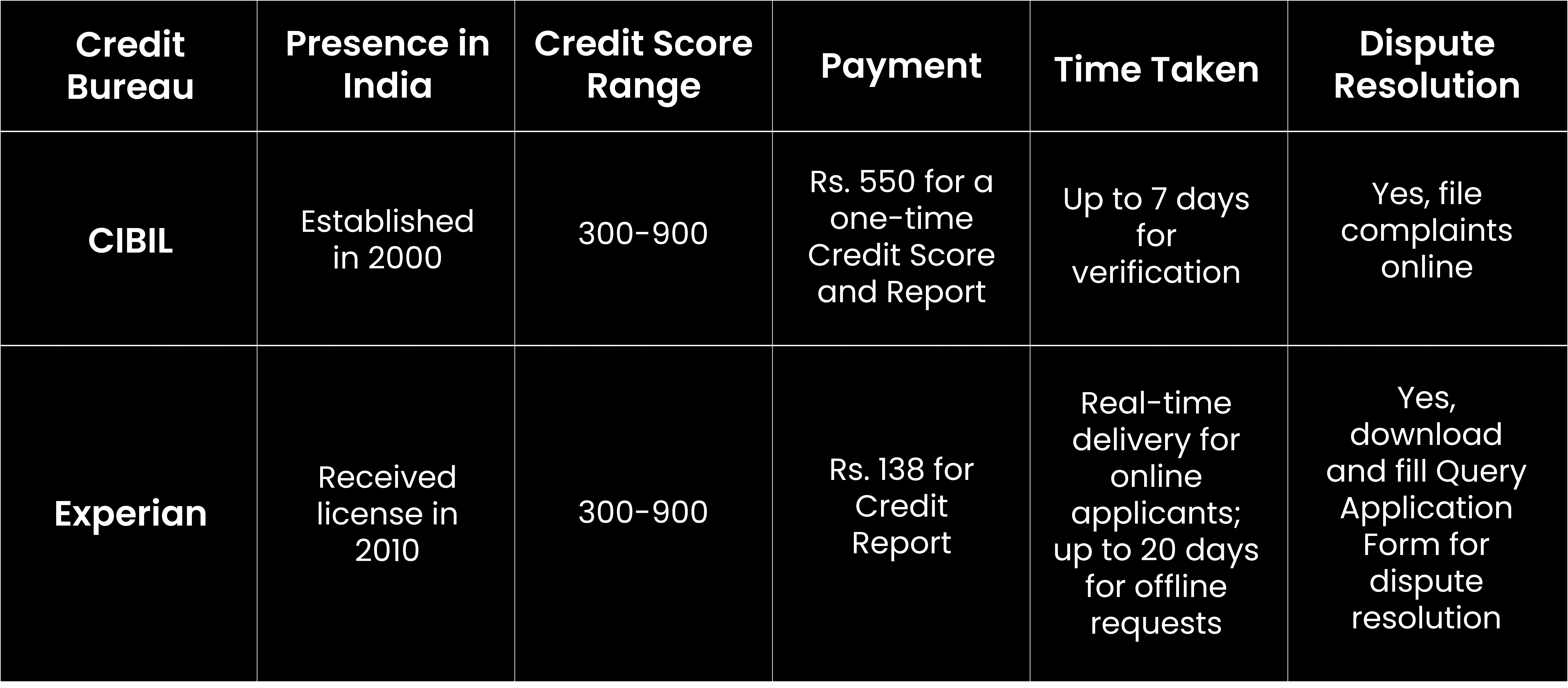Introduction
One of the key components for determining your financial credibility is your credit score. Whether you’re applying for a loan, credit card, or even seeking to rent a property, your credit score plays a central role in how lenders, landlords, and financial institutions evaluate your trustworthiness. In India, two major credit bureaus, CIBIL (Credit Information Bureau (India) Limited) and Experian, dominate the credit reporting industry. Both have a profound influence on your creditworthiness, but they differ in their scoring systems, data collection processes, and reporting mechanisms.
If you’re applying for a loan or credit, understanding the nuances between these two bureaus is essential. In this article, we will explore the distinctions between CIBIL and Experian credit scores, shedding light on their similarities and differences to help you make informed decisions.
What Is a Credit Score?
Before diving into the specifics of CIBIL and Experian, let’s first clarify what a credit score is. A credit score is a numerical representation of a borrower’s creditworthiness, typically ranging from 300 to 900. The score is calculated based on an individual’s credit history and current credit behavior.
Lenders use credit scores to assess the likelihood that a borrower will repay their debt on time. A higher score indicates a lower risk for the lender and typically results in better loan offers with lower interest rates. On the other hand, a low score may result in rejection or higher interest rates, as the borrower is considered riskier.
Understanding CIBIL
CIBIL (Credit Information Bureau (India) Limited) was founded in 2000 and became India’s first credit bureau. Today, it operates as a subsidiary of TransUnion, a global leader in credit reporting services. CIBIL’s primary function is to collect and maintain credit information related to borrowers from various lenders, including banks, non-banking financial companies (NBFCs), and other financial institutions. This data is used to generate CIBIL credit reports and scores.
CIBIL’s credit score is one of the most widely used in India, with its score ranging from 300 to 900. The higher your score, the better your creditworthiness is considered to be. A CIBIL score above 750 is considered excellent and is often required for loan approvals with favorable terms.
Factors Considered by CIBIL:
- Payment History (35%): Timely repayment of loans and credit cards. Missed or delayed payments negatively impact your score.
- Credit Utilization (30%): The ratio of credit used compared to the total available credit. A lower ratio (below 30%) is favorable.
- Length of Credit History (15%): The duration of your credit history. A longer history of responsible credit usage boosts your score.
- Types of Credit Used (10%): A mix of secured and unsecured credit (like loans and credit cards) can positively affect your score.
- Recent Credit Activity (10%): The frequency of recent credit inquiries and new credit accounts opened. Multiple inquiries in a short period can lower your score.
CIBIL’s credit score calculation is heavily weighted towards payment history and credit utilization, which makes it essential to pay your dues on time and manage your credit responsibly.
How CIBIL Credit Reports Are Used:
- Loan Applications: Lenders rely on CIBIL reports to decide whether to approve or reject a loan application. A high score increases your chances of securing loans with favorable interest rates.
- Credit Card Approvals: Banks and financial institutions also use CIBIL scores when issuing credit cards. A higher score generally results in higher credit limits and more attractive terms.
- Mortgage Approvals: A good CIBIL score is often required for securing home loans. Lenders view high scores as a sign of responsible borrowing behavior.
Understanding Experian
Experian is a global credit reporting agency and operates in more than 40 countries, including India. Experian provides credit scores and reports, similar to CIBIL, to help lenders assess the creditworthiness of borrowers. Experian’s credit scores are also on a scale of 300 to 900, with higher scores reflecting better creditworthiness.
Experian has rapidly gained traction in India over the years and is now one of the top choices for lenders looking to assess a borrower’s credit risk. Experian gathers data from a variety of sources, including banks, financial institutions, credit card companies, and other lenders, to create a comprehensive credit report for individuals.
Factors Considered by Experian:
Like CIBIL, Experian uses several factors to calculate your credit score:
- Payment History: This is the most critical factor in the Experian credit score calculation. Your ability to repay loans and credit card bills on time is heavily weighted.
- Credit Utilization: The percentage of your credit limit you use. Keeping credit utilization low is essential to maintaining a good score.
- Credit Mix: The variety of credit types you have, such as home loans, personal loans, auto loans, and credit cards.
- Recent Credit Inquiries: How often you apply for new credit, with multiple inquiries in a short period signaling potential risk to lenders.
- Credit Account Age: The length of your credit history, with a longer history generally helping your credit score.
Experian’s approach to calculating a credit score is not radically different from CIBIL’s, but there are differences in how the data is weighted and processed.
How Experian Credit Reports Are Used:
- Loan Eligibility: Experian credit scores are used by many lenders, including banks and NBFCs, to determine your loan eligibility and the interest rate offered.
- Credit Cards: Credit card issuers also use Experian’s scores to determine your eligibility and decide your credit limit.
- Background Checks for Renting or Employment: In certain cases, Experian credit reports may be used by employers or landlords to assess a person’s financial reliability.
CIBIL vs Experian: Key Differences
While both CIBIL and Experian offer similar services, there are distinct differences between the two credit bureaus that are worth considering:
1. Data Collection Sources:
- CIBIL: Primarily collects data from banks, NBFCs, and other lending institutions. It is the oldest credit bureau in India and has the widest reach.
- Experian: Collects data from a wide variety of sources, including banks, NBFCs, telecom companies, and even some retail organizations. It has a growing presence in India but is not as established as CIBIL.
2. Score Calculation Methodology:
While both bureaus use similar parameters, they have slightly different weightings for factors like credit mix and recent inquiries. This results in small differences in the credit scores generated by each bureau.
3. Credit Report Presentation:
- CIBIL: CIBIL credit reports are generally more detailed and may include individual loan types and their respective balances. It is widely used by lenders for detailed credit analysis.
- Experian: Experian’s reports are also comprehensive but may be presented in a more user-friendly format, making them easier for the average consumer to understand. Experian provides both free and paid services, which are accessible to more people.
4. Market Penetration:
- CIBIL: Being the oldest and most recognized bureau in India, CIBIL is accepted by almost all banks and financial institutions.
- Experian: Although Experian is gaining in popularity and is used by many lenders, some banks and financial institutions might still prioritize CIBIL scores over Experian.
5. Free Credit Score Access:
- CIBIL: CIBIL offers a free credit score check once a year through its official website, but users must pay for detailed reports and more frequent updates. To obtain an updated report or score, you often need to subscribe to CIBIL’s services.
- Experian: Experian, on the other hand, provides free access to your credit score and report with certain limitations (e.g., a monthly or quarterly free check depending on the plan). Experian also offers more frequent free credit score updates through their app, which can be helpful for consumers who want regular monitoring of their credit status.
This flexibility in access to your credit score can be a deciding factor for some users who prefer ongoing, cost-free monitoring of their credit health.
Choosing Between CIBIL and Experian
When deciding between CIBIL and Experian for assessing your credit score, it’s essential to consider a few key factors:
- Lender Preferences: Some lenders might place more weight on one bureau’s score over the other. However, the Reserve Bank of India (RBI) mandates that all credit bureaus receive the same data, so the information in both reports should largely be the same.
- Score Variations: Because the two bureaus use slightly different scoring models, your credit score might differ between CIBIL and Experian. It’s advisable to check both scores regularly to get a holistic view of your financial standing.
- Ease of Access: Both CIBIL and Experian provide consumers with access to their credit reports online, but Experian is known for offering a more user-friendly platform, especially for individuals new to credit score monitoring.
Despite these differences, the general principle remains the same: maintaining a good credit score requires responsible borrowing behavior. Regularly checking your credit report, keeping your credit utilization low, and ensuring timely payments are the key steps to building a strong credit history.
Comparison Overview

How to Improve Your CIBIL and Experian Scores
Regardless of whether you are looking at CIBIL or Experian, the strategies for improving your score are similar:
- Timely Bill Payments: Ensure that you never miss a payment for loans or credit cards. Timely payments are the largest factor in determining your score.
- Limit Credit Utilization: Aim to keep your credit card usage below 30% of the available credit limit. High utilization can significantly lower your score.
- Diversify Credit Types: Having a mix of credit types (secured and unsecured) can positively impact your score. But only take on new credit if necessary.
- Reduce Credit Inquiries: Avoid frequent credit inquiries, as too many in a short time can indicate financial distress and may lower your score.
- Check Your Credit Report Regularly: Regularly reviewing your credit reports from both CIBIL and Experian ensures that no errors have been made and allows you to address discrepancies quickly.
Conclusion
Both CIBIL and Experian are crucial players in the Indian credit ecosystem, providing essential services that help lenders assess borrower risk. While there are some differences in their score calculation methods, both are reliable, and lenders accept both credit reports for making decisions regarding loan eligibility and credit card approvals.
Whether you choose CIBIL or Experian, it’s important to understand the intricacies of your credit score and take steps to improve it. By managing your credit responsibly, you can ensure that your credit score remains high, which in turn improves your chances of securing loans and credit cards with favorable terms.
Ultimately, CIBIL and Experian are two sides of the same coin, and each offers valuable insights into your creditworthiness. Regular monitoring and responsible financial habits are the best ways to leverage these tools to secure your financial future.
Regardless of your choice, actively managing your credit score by regular monitoring, timely bill payments, and maintaining a low credit utilization ratio is crucial. These proactive steps can enhance your credit score, improving your loan offers while applying with digital lending platforms like Olyv India.

